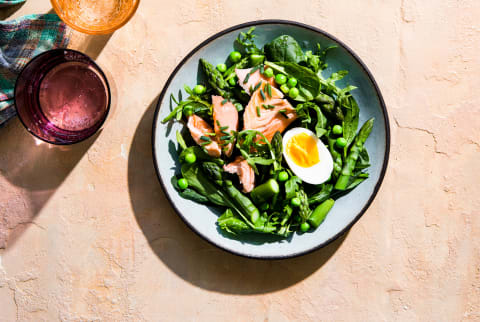Advertisement
After A 40-Year Career In Nutrition, This Is The Cardiocentric Diet My Mentor Follows


Did you know that the trajectory of your bone health is mostly determined by age 20? In fact, 90% of peak bone mass is accrued by late adolescence. This means that investment in your bones must start early on.
That fact is what inspired Richard Lewis, Ph.D., R.D., to invest the past four decades researching the impact of key modifiable lifestyle factors (nutrition, physical activity, and body composition) on childhood bone health for the prevention of osteoporosis later in life.
I had the honor of recently catching up with Lewis, my mentor, to understand what this year's National Nutrition Month theme means to him after his 40-plus-year career in nutrition.
Lewis is one of the University of Georgia's most beloved nutrition professors and prolific researchers. He was my doctoral adviser at UGA, where I received my Ph.D. in foods and nutrition. After making invaluable research, teaching, service, and public health and sports nutrition contributions, Lewis retired in 2020, now holding the distinguished title of UGA Foundation professor emeritus.
During his career, Lewis received $10 million in research grant funding and published over 100 peer-reviewed research articles and book chapters. In addition to key contributions to childhood obesity prevention, Lewis's research focused on the impact of micro- and macronutrients (specifically vitamin D, zinc, and protein) and exercise on pediatric bone development for osteoporosis mitigation in adulthood. Through the decades, Lewis also spearheaded a variety of outreach activities focused on osteoporosis and obesity prevention.
Lewis and I recently caught up to discuss National Nutrition Month and the importance of personalized nutrition, plus his own dietary approach and the local vegetables he fills his plate with:
What does this year's National Nutrition theme "Personalize Your Plate" mean to you?
When I first started in the field of nutrition 43 years ago, I quickly learned that for clients to be successful over the long term, nutrition care plans needed to be tailored to their specific needs and cultural preferences. Before my career in academic research and teaching, I worked in rural Appalachia as a public health nutritionist.
The typical diet of this Appalachian region in North Carolina included foods such as pinto beans ("soup beans"), potatoes, cornbread, dairy, and vegetables. My clients ate little meat but did incorporate some pork into the "soup beans."
For nutrition recommendations to be adopted, I honored my clients' unique Southern food culture and traditions, while partnering with them to implement key dietary modifications to improve intake of nutrient-dense foods and reduce chronic disease risk. For example, I would help them find ways to add more high-quality protein into their diet and make smart swaps, like baked potatoes instead of fried potatoes, and healthy oils instead of lard for cooking.
Do you follow a specific dietary pattern?
I do not follow a specific plan, but my diet is most reflective of a heart-healthy DASH dietary pattern, with an emphasis on vegetables (especially leafy greens), fruits, low-fat dairy foods, whole grains, protein (e.g., fish, poultry, pork, and legumes), nuts, seeds, and healthy oils.
My cardiocentric nutrition approach is intentionally heavy on legumes. Aside from enjoying their variety and taste, legumes offer significant health benefits related to lipids (i.e., helping lower cholesterol) and the prevention of cardiovascular disease.
What's your go-to nutrient-dense meal right now (breakfast, lunch, or dinner)?
One of my personal favorite meals includes fresh greens (especially kale and mustard or collard greens), legumes like curried lentils and chickpeas, and fish. Grilled red snapper and cod make my shortlist for favorite fish varieties, and fresh garlic, pepper, and lemon are choice seasonings. This nutrient-dense dish can easily be personalized with other seafood or alternative, high-quality protein selections.
Is there one "MVP" healthy food or meal addition you're personally loving right now?
"MVP" foods that are an essential part of my daily diet include key probiotic foods, specifically nonfat Greek yogurt and kefir. Equally important are greens. This season, leafy greens like kale, mustard greens, and collard greens are complementing several of my meals each week.
I live near a rural farming community, and one family offers a self-serve fruit and vegetable stand. Every week I purchase fresh greens, and they are so inherently tasteful that all I need to do is steam them.
All of this talk of greens reminds me of the first seminar I presented in graduate school, "The Nutritional Value of Collard Greens." Having grown up in Atlanta eating collards often with my family, I was excited to explore the science behind these delicious greens' built-in nutritional benefits as a young researcher. The answer then is still true today: Collards are a good source of protein; fiber; calcium; iron; potassium; and vitamins A, C, and K.

Ashley Jordan Ferira, Ph.D., RDN is mindbodygreen's former Vice President of Scientific Affairsd. Ashley received her B.A. in Biological Basis of Behavior from the University of Pennsylvania (along with a double minor in Nutrition and Music) and Ph.D. in Foods and Nutrition from the University of Georgia. Her research contributions span vitamin D, cardiometabolic health, bone density, and weight management. Ferira is a nutrition scientist and dietitian with experience in nutrition product innovation and development, scientific affairs, education, communications, and SEO writing for global firms, including Nature Made, Metagenics, Three Ships, and mindbodygreen.
In addition to her mindbodygreen contributions, Ferira is published in Health, Metagenics Institute, American Family Physician, The Journal of Clinical Endocrinology & Metabolism, and Osteoporosis International. She has a passion for the translation of evidence-based science into innovative and high-quality products and information that help people lead healthier lives. She is a believer in compassionate, informed, and personalized approaches to nutrition, health care, and wellness. Ashley lives in beautiful Charleston, South Carolina, where she was born and raised. Whether savoring an orchestral performance or delectable meal at a local restaurant, you will find her enjoying Charleston’s cultural and culinary arts with family and friends.
More from the author:
Functional Nutrition Training
Check out Functional Nutrition Coaching
A cutting-edge nutrition deep dive taught by 20+ top health & wellness experts
Learn moreMore from the author:
Functional Nutrition Training
Check out Functional Nutrition Coaching
A cutting-edge nutrition deep dive taught by 20+ top health & wellness experts
Learn more
Ashley Jordan Ferira, Ph.D., RDN is mindbodygreen's former Vice President of Scientific Affairsd. Ashley received her B.A. in Biological Basis of Behavior from the University of Pennsylvania (along with a double minor in Nutrition and Music) and Ph.D. in Foods and Nutrition from the University of Georgia. Her research contributions span vitamin D, cardiometabolic health, bone density, and weight management. Ferira is a nutrition scientist and dietitian with experience in nutrition product innovation and development, scientific affairs, education, communications, and SEO writing for global firms, including Nature Made, Metagenics, Three Ships, and mindbodygreen.
In addition to her mindbodygreen contributions, Ferira is published in Health, Metagenics Institute, American Family Physician, The Journal of Clinical Endocrinology & Metabolism, and Osteoporosis International. She has a passion for the translation of evidence-based science into innovative and high-quality products and information that help people lead healthier lives. She is a believer in compassionate, informed, and personalized approaches to nutrition, health care, and wellness. Ashley lives in beautiful Charleston, South Carolina, where she was born and raised. Whether savoring an orchestral performance or delectable meal at a local restaurant, you will find her enjoying Charleston’s cultural and culinary arts with family and friends.